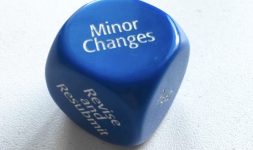
Why Use Transcribers and Not Speech Recognition Software? | Lex Academic Blog
Researchers armed with accurate transcripts, produced with attention and sensitivity by professional transcription services, are best equipped to establish patterns, draw meaningful conclusions, and contribute substantively to collective knowledge. For this reason, the work of human transcribers remains, and will continue to be, deeply valuable in the age of AI.

How to Control Your Email (So It Doesn’t Control You)
7th June 1984 and a young television presenter called Jane Ashton is fronting a Thames TV programme called Database. As the introductory synth fades out, Ashton gestures towards a screen besides her onto which the Green family, a husband and wife, appear . ‘We’ll be linking from the Database studio to their home’, she promises, […]

‘Tis the Season to be… | Lex Academic Blog
For some academics – especially first-generation academics, or those not from academic families – returning home can mean encountering a family that has no idea what you do, or what the point of your research is. Why did you dedicate your life to studying the bubbles in washing up liquid?

Applying for PhD Funding | Lex Academic Blog
You might be the most capable scholar, producing exciting work, yet fail to get your PhD funded if you don’t pay extremely close attention to what a committee is looking for and provide precisely that.

Preparing For a New Academic Year as a Graduate Student | Lex Academic Blog
As a community of veteran academics, we have some thoughts that we’d like to share with you about making the most of the new academic year.

The UK Joins Horizon Europe
In a recent and highly anticipated move, the United Kingdom has officially re-joined the European Union's Horizon Europe programme as a full associate member.

How to Choose the Right Journal for Your Work | Lex Academic Blog
Different types of journals are suitable for different stages of your career. Some scholars might value impact factors above all else; others care little for such metrics – in some fields, impact factor hardly registers. Top-class journals can have long turnaround times. Maybe the journal you choose looks good at first, but focuses on developing new methodologies when your contribution is a theoretical one. An article can also be rejected from a journal even if it’s well written and the perfect fit: perhaps they’ve just published an article on a similar topic, or they may simply be swamped with submissions and/or understaffed. The best protection from any of these frustrating rejections is to choose a journal early, and to choose it well.

Transforming a PhD Chapter into a Journal Article | Lex Academic Blog
As a newly minted PhD, or student approaching the closing stages of your degree, you will already know what a peer-reviewed article is and why it is important to a scholarly career. A PhD chapter can come to life as an article, but it needs to be prepared a little differently; excised from the body of the thesis and made to live independently.

Getting In and Getting On During Doctoral Study | Lex Academic Blog
Academic heavyweights can lend considerable cachet to a young researcher’s CV, but they typically only offer scant and patchy supervision to their attention-starved students. This is a trade-off about which prospective PhD candidates ought to be mindful. Namedropping a heavyweight or two when listing one’s PhD supervisors may pay dividends down the line, as those name-brand references will no doubt open many doors during a lifetime of academic job applications, but it may be a challenging, lean, and lonely doctoral experience.

Examining a PhD in the UK: 10 Ways to Lead a Viva
In this blog post, we offer advice to would-be external examiners on how to effectively approach and manage doctoral examinations in the UK setting.

East & Southeast Asia Philosophy Publishing Workshop
The Lex Academic Philosophy Publishing Workshop: East & Southeast Asia Date: 24 May, 2023 Time: 18:00–19:30 (Japan); 17.00–18.30 (Taiwan); 16.00–17.30 (Thailand); 10.00–11.30 (UK). Participants Kanit (Mitinunwong) Sirichan (Chulalongkorn University, Thailand) Kengo Miyazono (Hokkaido University, Japan; Editor, Philosophical Psychology; Associate Editor, Philosophical Explorations) Sascha Benjamin Fink (University of Leipzig, Germany; Co-Editor-in-Chief, Philosophy and the Mind Sciences) Ying-Tung […]

Applying for a Research Grant: Some Dos and Donts | Andrei A. Buckareff
Suppose you’ve found a funding body to which you are interested in submitting a proposal for a grant. What now? Assuming that this is your first grant application, we recommend the following: collaborate with a veteran; go small; and find a niche that fits well with the vision of the agency from which you are requesting a grant.

Five Reasons Why Writing Your First Article Need Not Detract from Writing Your Dissertation | Lex Academic Blog
Should you be publishing peer-reviewed articles while in grad school? In the sciences, the response to this question would be a resounding 'yes'. In the humanities and social sciences, however, not everyone does this. Some prefer to start publishing only after defending their thesis.

Romance your Research | Lex Academic Blog
It’s hardly a surprise that some days you want to walk (run) away from your research out of boredom and frustration or seek a get-out clause in the desperate hope that absence will make the heart grow fonder. But escaping from the relentless admin and tedious Teams meetings that sit alongside a research career would also mean leaving your one true love.

How to Give and Receive Feedback | Lex Academic Blog
As academics, and even as students and managers, we’re asked to review and give feedback on everything from how a conference workshop went to our peers’ theories and methods. When we give feedback in our professional lives, we are fundamentally letting our thoughts be known.

The Perfect Book Title | Lex Academic Blog
For non-fiction in particular, including academic titles, the needs of a library and bookshop give us a seemingly obvious place to start when creating our own titles. Anyone penning a title today will obviously require it to be clear, descriptive, attractive, consistent with the content and regular across all future versions.

Passing Your Viva with No Corrections: Towards an Outstanding PhD | Lex Academic Blog
The meaning we associate most immediately with ‘outstanding’ is perhaps that of ‘excellent’ or ‘first-rate’: an outstanding PhD is one that ranks high on some sort of classificatory scheme. But this meaning, I suspect, is derived from its more literal meaning, that of standing out from the crowd. Those PhDs that do this will indeed be the few that make it into the top tier of PhDs that are passed with ‘no corrections’ (cum laude or summa cum laude in other systems such as in Germany or the Netherlands) – but this quantitative feature is only a result of their qualitative merit: a truly outstanding PhD is one that stands out because of its original insight.

How to Get Copyright Permissions for Your Book | Lex Academic Blog
Obtaining the rights to reprint photographs, graphics, or lines of poetry is a notorious faff, which is why we offer a fully comprehensive professional text and image permissions service that takes all the stress and anxiety away for you. But, in this blog, we’ll review the things you need to consider when sourcing images or quotations to populate your academic books and articles yourself.

How to Get a Book Contract as an Independent Researcher | Lex Academic Blog
Acquiring a book contract is often a lengthy process. However, a good idea, a clear sense of your book’s argument and contribution to scholarship, as well as a well-researched target market, will make all the difference in finding the right publisher.

How to Prepare for your PhD Viva | Lex Academic Blog
In many parts of the world, a thesis defence retains its sense of theatre. In Sweden, you may be asked to literally nail your thesis to a wooden board. In Germany, once your defence is over, it is possible your supervisor will pull you down the street on a mobile throne. In Finland, you receive a doctoral sword and a hat. The public, performative oral component of such systems endures, though defanged and more or less a part of the ceremony for those who have already proved themselves. In the UK, the opposite is the case.

Choosing the Right Publisher for Your Work | Lex Academic Blog
Unless you are exceptionally lucky, the process of publishing your work can be challenging, emotional, and fraught with tough decisions. In light of this, it is really important to place your work in the best possible hands.

Insider Tips on Getting Published in English-language Journals | Karen Englander, Ph.D. | Lex Academic Blog
When English is your second language (and even when it isn't), passing through a journal's peer review process can be challenging. What is an author to do to improve their prospects of sailing through peer review? We have some ideas.

How to Surmount ‘Blank Page’ Syndrome | Lex Academic Blog
One of the biggest challenges of undertaking an extended piece of research, whether it’s facing your PhD or fulfilling a brief from a publisher, is simply getting the words down. There is nothing more daunting than a large word count to fulfil, especially if English is not your native language. Here are a few pointers about getting into good, manageable writing habits.

Decoding a Book Proposal Form | Lex Academic Blog
Publishers' book proposal forms can feel broad and vague with not a huge amount of guidance on what each of the questions and sections is asking of you. With that in mind, Liza Thompson of Bloomsbury thought the most useful thing to do would be to work through the main sections of a proposal form and hopefully ‘decode’ them.

‘Coming Out’ as Working Class in Academia | Lex Academic Blog
'Since my "coming out", I’ve been told by middle-class academics I don’t belong in academia. And people I’ve known most of my life have accused me of being a class traitor.' We spoke to Dr Paul Craddock about getting on (and getting along) in academia.

Mastering the Move from PhD to Postdoc/Junior Lecturer: A How-To Guide | Lex Academic Blog
Planning your move from PhD to postdoc can come at a time when you are time-poor, burnt out, and struggling to remember why you ever wanted an academic career. In this post, we enumerate a few things to remember at this time of fraught (but thrilling) transition.

Mastering the Move from Master’s to Doctoral Study: A How-To Guide | Lex Academic Blog
After admission to a PhD program, many students may find themselves struggling to navigate new expectations for study. Once installed firmly at a workspace, what should a new doctoral student do?

Why a Great Thesis Doesn’t Always Make a Great Book | Lex Academic Blog
One of the most common reasons why publishers reject proposals for PhD-derived monographs is that they give the impression that the author does not understand the difference between a thesis and a book. In this post, we will look at some of the differences.

‘What’s in a name?’: How to Title Your Publications | Lex Academic Blog
A well-crafted title generates more reader engagement, increasing the citation rate and impact of a publication. For many of us, though, coming up with a title is challenging. In this post, we will share a few tips on titling publications.

How to Write a Postdoc Research Proposal | Lex Academic Blog
In an increasingly competitive job market, securing a postdoc somewhere is probably the best option many recent graduates can hope for. Here's our how-to guide to writing a postdoc research proposal.

From PhD to Monograph: How to Revise Your Thesis for Publication | Lex Academic Blog
Most early career researchers in the arts and humanities are encouraged to see their PhD thesis as a monograph-in-waiting – and with good reason. Here's our how-to guide to revising a thesis for publication and kick-starting an academic career.

How to Avoid Major PhD Corrections | Lex Academic Blog
As a follow-up to our recently published how-to guide to avoiding minor PhD corrections, we thought it would be useful to produce a post on major corrections. Here's some advice on how to avoid them.

How to Avoid Minor PhD Corrections | Lex Academic Blog
Passing your PhD with minor corrections is what most students aim for. But who wouldn't prefer to pass with no corrections? Here are a few tips for avoiding even minor corrections.

Cite Right: Harvard Style
Lex Academic's succinct how-to guide for citing in Harvard style.

Cite Right: APA Style
Lex Academic's succinct how-to guide for citing in APA style.

DIY Indexing for Academic Authors | Lex Academic Blog
Many authors use professional indexers like Lex Academic to get a difficut job done with efficiency and flair. With the right guidance, however, creating your own index can be both enjoyable and rewarding. Here's our how-to guide on indexing your own book.

Cite Right: MHRA Style | Lex Academic Blog
Lex Academic's succinct how-to guide for citing in MHRA style.